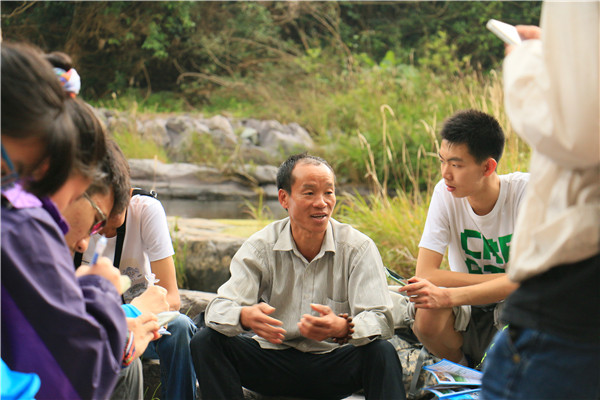Going beyond tourism
By Chen Liang ( China Daily ) Updated: 2015-07-11 08:15:07
 |
|
Jin Hai (middle),a villager of Daoyin village, tells stories of the Li ethnic group. [Photos Provided To China Daily] |
Sustainable
Luo tells China Daily in a cafe in Beijing that the real ecotourism should be a good way for development in the country's protected areas. "But only commercial success can guarantee that it is sustainable," she says.
Luo, 32, had gained the insight into nature and conservation through her academic studies and involvement in several projects, and made up her mind to pursue a career in the niche business.
She studied biology at the prestigious Beijing Normal University in 2002 and became a nature lover through her biological fieldworks. After graduation in 2006, she pursued her master's degree with professor Sun Yuehua, a leading Chinese ornithologist, in the Chinese Academy of Sciences, and studied a species of finch in the Lianhuashan National Nature Reserve in Gansu province.
Before her graduation in 2009, she helped organizing the Society for Conservation Biology's International Congress for Conservation Biology, the most important international meeting for conservation professionals and students, in Beijing. Professor Sun was secretary general of the meeting's organizing committee.
"It was the first time the meeting being held in China and so there was a lot of organizing work to do," Luo says. "While designing and arranging field trips for participants of the meeting, I found I was pretty good at coordinating and organizing things."
After graduation, she started working with a local grassroots NGO in Beijing as an environmental education officer.
In 2011, she designed an eco-tourism project for environmental education to take part in a social innovation competition that was organized by a Chinese airline. Her project was one of 10 chosen for the final round of the competition.
In the following year, she started organizing eco-tours in Beijing. "It was not for profit, but a kind of nature education familiarization tour for children and their parents," the Sichuan native says.
She charged 100 yuan ($16) per person for a group of about 20 participants. A typical outing would feature a tour of the Beijing Botanical Garden, with PhD students of botany teaching participants how to identify some plants in the mornings, and participants learning botanical photography, painting or handwork in different groups in the afternoons.
"The fees were used to hire teachers," she points out. "My alumni from both the university and the academy are good resources."
|
|
|
|
|
|
|
|

























 Raymond Zhou:
Raymond Zhou: Pauline D Loh:
Pauline D Loh: Hot Pot
Hot Pot Eco China
Eco China China Dream
China Dream China Face
China Face






